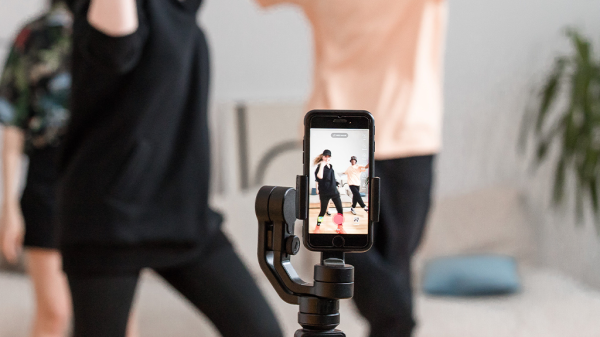
Big money, big money!
In order to obtain funding, every tech startup has to show investors what their financial strategy is – some begin as free communities that turn premium, others are ad supported, but in an interesting twist, Pinterest has opted for a different alternative wherein they use a service called Skimlinks, according to VentureBeat, which swaps out links behind product pins and replaces the source link with an affiliate link.
For example, any product pinned from Amazon will automatically have a replaced link that becomes an affiliate link so that Pinterest gets a cut if someone makes a purchase from their referral. Some are calling this move questionable and deceptive, others have no problem with the blossoming startup to make money through affiliate dollars.
Josh Davis at LLsocial.com was first to notice the sneaky switch, noting, “I, like many people, don’t have a problem with Pinterest making money off of user content. The links are modified seamlessly so it doesn’t affect the experience. Pinterest likely should disclose this practice to users even if they aren’t required to do so by law, if only to maintain trust with their users.”
Why not the Twitter approach?
As it stands, it appears that only links leading to a retailer that has an affiliate program (like Amazon, eBay, etc.) will have the original source code altered, but if Pinterest is not forthcoming with this revenue strategy in a way that users are aware of and accepting of, what covert moves will be made next? The albatross around Facebook’s neck that they continue to skirt is privacy issues, ignoring user preferences (or “rights” as advocates will claim) – will Pinterest’s albatross be secret revenue streams?
We all anticipated that Pinterest would take a page from Twitter’s playbook and have promoted pins or promoted boards, placing brands’ paid pins in a fixed position or mixed in with people you are already following, but this is an interesting twist indeed. Do you think it is okay for Pinterest to swap out the original source code in pins you create, or are they within their rights to make money off of products you share?
Tell us in the comments if you would like an invitation into Pinterest, we will share ours right away. Please connect with us on Pinterest as we continue pinning away:

The American Genius is news, insights, tools, and inspiration for business owners and professionals. AG condenses information on technology, business, social media, startups, economics and more, so you don’t have to.












































Ricardo Bueno
February 8, 2012 at 2:42 am
I'm not against them finding a way to monetize – good for them, especially on a service that's free to users. What I don't like however, is the lack of disclosure. I find it deceitful.
suzanne
February 8, 2012 at 7:32 am
I do not think this should be done w/o disclosing……it IS deceitful. Lack of trust from the get go is NOT good.
Lisa Young
February 8, 2012 at 9:41 am
I'm not particularly keen on the lack of disclosure, and I know one of my boards is nothing but books I recommend with my own Amazon links, which means they're swapping out my link for theirs. It's not like I make a ton of money on it, and I'd recommend the books whether or not I make anything off the links, but it's still kind of creepy that they don't disclose that anywhere. Makes you wonder what else they're not disclosing.
Deidre
February 8, 2012 at 11:30 am
I think this speaks to the growing trend on the internet of site owners profiting off of user generated content. It was one thing when ads ran next to content that writers had been paid for but now Facebook, Twitter, Pinterest and other social sharing sites are essentially monetizing content that users are giving away for free. That's fine if the users are aware of it but it's sneaky if users are contributing to a company's bottom line and not aware of how their content is being appropriated.
Jessie Geroux
February 8, 2012 at 10:16 am
I much prefer this route (but would love the disclosure piece) over having to wade though promoted/paid for pins—to me sliding in promoted 'pins' with the people I already follow is just as sneaky if not more, because it makes it seem like I somehow chose that to be there because I had chosen to follow the person that pinned it.
Mickey
February 8, 2012 at 10:22 am
To Lisa's point, what if someone is trying to use Pinterest to promote their own affiliate links? In that case, Pinterest is doing a disservice to certain users. At the very least they need to be clear and up-front about the practice, not allow folks to just stumble upon this information. It gives them the appearance of being deceptive.
Having said that, clearly they need to generate revenue somehow. I have no issue with them doing so, it's just important to be up front about it.
Vicki Flaugher
February 8, 2012 at 10:25 am
This is illegal. Unless Pinerest fully and openly discloses affiliate revenue link usage, they are not following the FCC rules. They will likely get fined and fined big, likely enough to shut down this clearly struggling (and burgeoning) start up. Google fcc endorsment disclosure and you will find all the relevant information. Not cool. Completely not cool.
Mitch Labuda
February 10, 2012 at 12:26 pm
The Pinterest TOS includes member content, which per the site, is also links.
I asked if links are considered member content and the answer is, so the site lays claims to links per the TOS.
Bill Hibbler
February 10, 2012 at 12:34 pm
Personally, I don't have a problem with it. I'm not sure they're violating FTC regulations as they aren't endorsing or promoting the products and I much prefer this to slipping in sponsored pins.
However, they should be aware that a good portion of their users will be offended by the idea of them somehow profiting from their users pins under any circumstances and the majority will be upset about the lack of transparency. Given the traction this story is getting today, I think we'll see disclosure on the site soon.
Thevelvetkitten
February 11, 2012 at 10:24 pm
Yes,I have a problem when it is my stuff being loaded by a 3rd party and it is my work and by their toa,that 3rd party gives them full rights to even SELL . I call BS!!!
Not to mention if I don't want my stuff there I will never find all of it to have it removed. Nor do I have the time or should I even have to make the time to police their site.
Enough is enough.